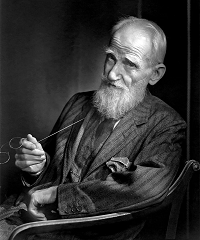
George Bernard Shaw (1856-1950) was born in Dublin, the son of a civil servant. His education was irregular, due to his dislike of any organized training. After working in an estate agent’s office for a while he moved to London as a young man (1876), where he established himself as a leading music and theatre critic in the eighties and nineties and became a prominent member of the Fabian Society, for which he composed many pamphlets. He began his literary career as a novelist; as a fervent advocate of the new theatre of Ibsen (The Quintessence of Ibsenism, 1891) he decided to write plays in order to illustrate his criticism of the English stage. His earliest dramas were called appropriately Plays Pleasant and Unpleasant (1898). Among these, Widower’s Houses and Mrs. Warren’s Profession savagely attack social hypocrisy, while in plays such as Arms and the Man and The Man of Destiny the criticism is less fierce. Shaw’s radical rationalism, his utter disregard of conventions, his keen dialectic interest and verbal wit often turn the stage into a forum of ideas, and nowhere more openly than in the famous discourses on the Life Force, «Don Juan in Hell», the third act of the dramatization of woman’s love chase of man, Man and Superman (1903).
In the plays of his later period discussion sometimes drowns the drama, in Back to Methuselah (1921), although in the same period he worked on his masterpiece Saint Joan (1923), in which here writes the well-known story of the Frenchmaiden and extends it from the Middle Ages to the present.
Other important plays by Shaware Caesar and Cleopatra (1901), a historical play filled with allusions to modern times, and Androcles and the Lion (1912), in which he exercised a kind of retrospective history and from modern movements drew deductions for the Christianera. In Major Barbara (1905), one of Shaw’s most successful «discussion» plays, the audience’s attention is held by the power of the witty argumentation that man can achieve aesthetic salvation only through political activity, not as an individual. The Doctor’s Dilemma (1906), facetiously classified as a tragedy by Shaw, is really a comedy the humour of which is directed at the medical profession. Candida (1898), with social attitudes toward sex relations as objects of his satire, and Pygmalion (1912), a witty study of phonetics as well as a clever treatment of middle-class morality and class distinction, proved some of Shaw’s greatest successes on the stage. It is a combination of the dramatic, the comic, and the social corrective that gives Shaw’s comedies their special flavour.
Shaw’s complete works appeared in thirty-six volumes between 1930 and 1950, the year of his death.
George Bernard Shaw died on November 2, 1950.
Nazira Artykbayeva, librarian of the International Book Department

